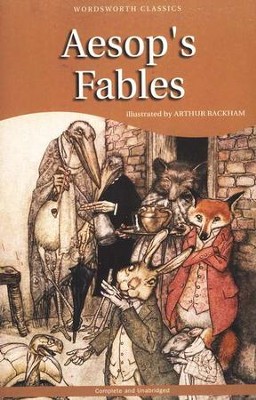
Aesop’s Fables are stories that are such cornerstones of our culture – small tales that have gone so far as to become part of our everyday language. I always find myself saying things like “slow and steady wins the race” referencing The Tortoise and The Hare, or “it’s a boy who cried wolf situation” referencing the story of the same name. If Aesop was indeed a real person (and that’s up for debate) he was an absolutely genius for coming up with stories that resonate so deeply (and even if he was real, we don’t know if the alleged Aesop came up with these stories himself, but I digress).
With such a collection of bite-sized stories, it’s easy to find the time to read one before bed each night and that’s exactly how I read Aesop’s Fables on my most recent read-through. Knowing just how old these stories are makes them so much more appealing to me, and it’s amazing to think about how long they’ve survived and for how long they’ve been giving people ways to interpret and understand things.
In addition to the two mentioned above (my two favourites), I was also very fond of The Lion and The Mouse, where a lion spares a mouse, who is later able to return the favour by gnawing through ropes that bind the lion, and there are plenty of others that are quite clever or poignant – but then there are quite a lot of them that don’t really have a good message at all.
Of course, these stories are thousands of years old, so it’s understandable that many of them might not have aged so well, but a common theme was that people ended up meeting with a bad fate if they ever hoped for anything more in life. ‘Know your place’ and ‘be grateful for what you have’ were common messages, and while I do think it’s good to encourage appreciation for the things you have in life, a lot of them had people ending up dying for ever trying to get something more for themselves, and I think that’s a bit of a rubbish message.
So while it can be quite clever at times, I think it’s best appreciated as a collection of historically significant stories. I still recommend this because the influence of these fables is enormous, but I wouldn’t recommend them as useful moral lessons for children.
Rating: 7/10
